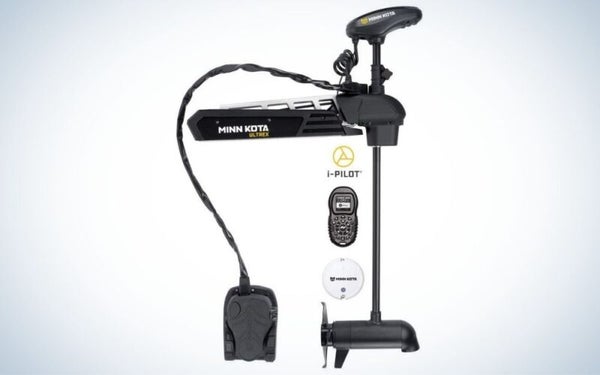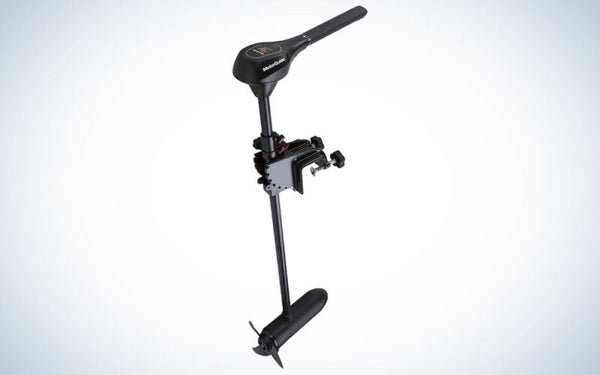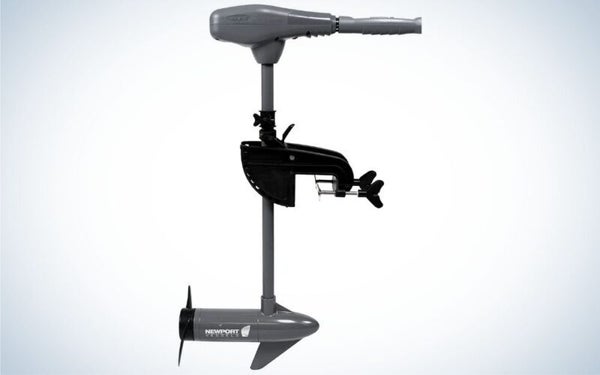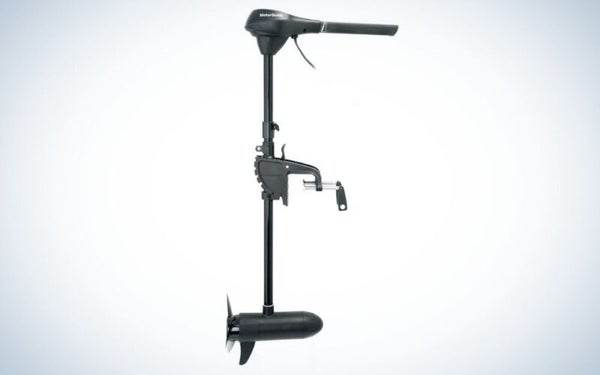We may earn revenue from the products available on this page and participate in affiliate programs. Learn more ›
If you want to make the time aboard your boat more enjoyable and catch more fish, the best trolling motors are worth the investment. It takes the work out of maneuvering a boat, lets you easily overcome the wind, and allows you to sneak quietly into position and drop a bait or lure precisely where it needs to be.
Today’s models range from simple hand-control units that clamp to a boat transom to advanced foot control models that feature a remote control, spot lock, GPS capabilities, and much more. With so many options, it’s easy to become overwhelmed. Below, we’ve broken it down for you and rounded up the best trolling motors, including our top pick for a kayak trolling motor.
The Best Trolling Motors
Best Remote Control: Minn Kota Terrova
Best Remote Control
Specs
- Volts: 24, 36
- Thrust Pounds: 80 lbs, 120 lbs
- Shaft Length: 45″, 60″
Pros
- Bluetooth connectivity
- Preinstalled i-Pilot integrated GPS
- Wireless remote with a touchscreen display
Cons
The Terrova comes with a wireless remote control that lets you run the motor without the foot control. Among many other capabilities, the remote has an autopilot capability—choose your direction, activate the iPilot, and the Terrova will automatically keep you on that course, adjusting for wind and current on the way. It also has spot lock technology, meaning it automatically keeps the boat in one place, along with an intuitive electric foot control that is superior to cable steering. The 36-volt version generates an impressive 112 pounds of thrust. This is a great option for anyone who is tired of constantly fighting with their motor and wants to focus more of their attention on the fishing.
Best for Bass Fishing: Minn Kota Ultrex
Best for Bass Fishing

Specs
- Volts: 36
- Thrust Pounds: 112 lbs
- Shaft Length: 52″
Pros
- i-Pilot GPS Trolling System
- Spot-Lock with Jog
- AutoPilot
- No more manual raising and lowering of the motor
Cons
Lifting and lowering an electric trolling motor in and out of the water by hand can be a literal pain in the back, especially if you have medical conditions. The Ultrex completely eliminates this chore because you can stow, deploy and trim the motor from the remote or the foot pedal. LIke the Terrova above, the Ultrex has a remote that allows you to employ spot lock, record trolling paths, adjust the speed and steering, and enable the autopilot to automatically navigate in any direction you choose. The motor will also link to some Humminbird fish finders, which allows it to perform other remarkable feats, such as following a depth contour. The 36-volt version generates an impressive 112 pounds of thrust. This trolling motor is extremely expensive, but it’s loaded to the gills with incredible features you won’t find on many other options on the market.
Best Transom Mount: MotorGuide R5
Best Transom Mount

Specs
- Volts: 36
- Thrust Pounds: N/A
- Shaft Length: 42″
Pros
- Made from steel and aluminum
- Strong battery life
- Affordable
Cons
One of the most powerful 36-volt trolling motors on the market, the MotorGuide R5 generates 105 pounds of thrust at the highest of its five speeds. The durable, composite 42-inch shaft is a good length for most freshwater fishing boats. Digital Power Management Technology monitors the motor’s amp-draw, heat dissipation, output, and other parameters, resulting in a cooler-running, longer-lasting motor. The extending handle makes steering more convenient. This motor is a solid option for anyone who wants a quality, mid-priced trolling motor that is easy to use and operate.
Best for Kayaks: Newport Vessels Kayak Series
Best for Kayaks

Specs
- Volts: 12
- Thrust Pounds: 36 lbs, 55 lbs
- Shaft Length: 24″
Pros
- Extremely affordable
- Multiple speeds (forward & reverse)
- Saltwater rated
- Extra long battery cable for ideal weight distribution
Cons
- Not as durable
- Might not last many seasons
Kayaks usually require a specialized trolling motor. Something light that can operate for long hours and has a shorter shaft for the shallow draft of that type of craft. Weighing only 23 pounds, this motor won’t unbalance your kayak when fixed to a mount that puts the eight-speed telescoping handle close at hand. The 36-pound thrust model will zip your fishing kayak or canoe over the surface. The shaft is only 24 inches, making it a perfect choice for any craft with a shallow draft. As a bonus, this motor is saltwater rated. It’s ready to hit the mangroves or flats, yet is also capable of going offshore a bit. This is another solid kayak choice because it features an LED indicator that shows the battery’s current charge without having to add an additional volt charge indicator to your craft.
Best Budget: MotorGuide R3-30
Best Budget

Specs
- Volts: 12
- Thrust Pounds: 30 lbs, 40 lbs
- Shaft Length: 30″, 36″
Pros
- Extremely affordable
- Multiple thrust and shaft length options
- Multiple speeds (forward & reverse)
Cons
One of MotorGuide’s best selling hand-control trolling motors, the R3-30 is ideal for small freshwater boats. We like this one for anyone putting together a simple Jon boat setup for fishing or waterfowling. The 30-inch shaft is $139.99, and the 36-inch shaft is $209.99, making this an incredible value for budget-minded outdoorsmen and women. It runs on a single 12-volt deep cycle battery. Expect about 30 pounds of thrust from the 30-inch shaft, and 40 pounds of thrust from the 36-inch version. This is also a great option for casual anglers who want something for only a few fishing trips each year.
How We Evaluated Trolling Motors
There are a few critical aspects when looking at trolling motors, like battery life, voltage, shaft length, and thrust power. All of our picks were based on these considerations, and we used our experience on the water to make the best recommendations possible. Our selections were based on the following criteria:
- Battery Life: How long can the trolling motor run for on a full charge?
- Voltage: How strong is the battery? Is it powerful enough for your boat?
- Shaft Length: How long is the trolling motor? Are there different shaft options?
- Thrust Power: How fast or slow can the trolling motor go?
- Materials: Can the trolling motor be used in salt water?
Trolling Motor Buying Guide
There are three primary considerations to consider when selecting an electric trolling motor. How big is your boat? What type of boat do you have? And, how do you like to fish? A motor with 30 pounds of thrust will perform nicely as a canoe trolling motor. It should run on one deep cycle 12-volt battery.
A pontoon trolling motor can have as much thrust as you are willing to pay for. Since a pontoon boat can carry a heavy load, it may be equipped with two parallel-wired deep cycle batteries for 24 volts or 3 batteries in parallel for 36 volts. More volts mean more thrust and longer staying power.
Large, heavy fishing boats should be rigged with a powerful 36-volt motor.
Anglers who run their trolling motors constantly tend to wear down batteries faster than anglers who start and stop while casting. Diehard bass and walleye anglers are especially hard on batteries. They often stay out in windy conditions that force them to run their motors excessively at high speeds even while casting.
The electric motor’s shaft length is critical. It must be long enough to submerge the shaft and its propeller deep enough to prevent cavitation. If the shaft is too long, the top of the motor will sit high above the mounting bracket where it could get in the way. Some motors come with a single shaft length, while others have three or four options. A 30-inch shaft will suffice for a kayak, canoe, or small jon boat, while a saltwater fishing boat with a high freeboard may need a shaft as long as 87 inches.
A hand control motor is a way to go for those who want to (or must) run a small boat while sitting near the transom. You can use it as a true trolling motor, or for maneuvering after employing a gas powered tiller outboard to reach your fishing destination. On small waters, it can serve as the primary “get-there” motor.
Usage
A trolling motor that can be operated with remote control is a good choice for anglers who want a motor primarily for trolling. A wireless remote lets you control the motor while you move about the boat tending trolling lines, netting fish, and attending to others who may be aboard while operating the motor simultaneously. Such a motor is also a good choice for boats that don’t lend themselves to a foot control motor, such as a pontoon boat or a saltwater bay boat.
Bass Fishing
Bass anglers are best served by a bow-mounted trolling motor that has two attributes:
First, foot control. A foot control trolling motor is an absolute necessity for bass fanatics and other anglers who require stealth and precise maneuverability. Many foot control motors have cable steering, which has been the mainstay for decades. Recent innovative trolling motors feature an electric foot control that is as responsive and intuitive as cable steering, which was not the case with electric controls in the past.
A trolling motor with motorized deployment and retraction is especially helpful for bass anglers, who change locations multiple times during the day and must remove the motor from the water to get underway. The ability to lift and lower a motor by the push of a button ends that tiring and sometimes painful chore when done by hand.
A 24-volt foot control motor will do for bass boats up to about 19 feet in length. For longer and heavier boats the best option is a high-thrust 36-volt motor.
Kayaks
Paddling a kayak is good exercise, but paddles are a definite handicap when you’re fishing. It would take four hands to paddle a kayak in place against a breeze while simultaneously casting and retrieving. An electric kayak trolling motor makes this type of multi-tasking much easier.
FAQs
Q: What is the most powerful trolling motor?
The most powerful electric trolling motor is made by Minn Kota and is available in several configurations, including the Minn Kota Ultrex and Minn Kota Terrova detailed above. The 36-volt motor boasts an unparalleled 112 pounds of thrust.
Q: Will saltwater ruin a freshwater trolling motor?
Sooner or later, yes. Some freshwater trolling motors will hold up longer in saltwater than others, but you definitely need a saltwater trolling motor if you intend to use it in saltwater. Extra steps are taken to make a saltwater trolling motor stave off oxidation and rust, such as aluminum coatings and fully protected electronics.
Q: How long will a trolling motor battery last?
If you run them hard and often, expect them to last no more than two years. Those who use their boats infrequently may get three to four years or more out of them. However, this is only true if you get the right kind of batteries and maintain them properly. Only deep cycle marine batteries should be used as they can be recharged repeatedly. Get the largest marine batteries you can afford. With wet lead-acid batteries, the water level must be checked regularly. Closed cell batteries eliminate this chore. Charge the batteries as soon as possible after using them. Lithium batteries are superior but are prohibitively expensive for many people.
Q: What is the best trolling motor?
The Minn Kota Terrova and Minn Kota Ultrex represent some of the best of the best trolling motors as far as power, range, and features go. They come with a premium price tag, which is to be expected of any high quality fishing equipment.
However, if you don’t have an electric trolling motor on your boat, you don’t know what you’re missing. Having one of these motors eliminates multiple boating chores and hassles. It provides a more serene fishing experience, and yes—it will help you catch more fish in the long run.
Why Trust Us
For more than 125 years, Field & Stream has been providing readers with honest and authentic coverage of outdoor gear. Our writers and editors eat, sleep, and breathe the outdoors, and that passion comes through in our product reviews. You can count on F&S to keep you up to date on the best new gear. And when we write about a product—whether it’s a bass lure or a backpack—we cover the good and the bad, so you know exactly what to expect before you decide to make a purchase.
Read the full article here




